
Thanks to research, more people than ever are surviving their cancer. In the 1970s, just 1 in 4 people in the UK survived cancer for 10 years or more. Today, that figure has doubled. But, we have so much more to do. We need to go further, and faster.
-
Some Sunday Post online content is funded by outside parties. The revenue from this helps to sustain our independent news gathering. You will always know if you are reading paid-for material as it will be clearly labelled as “Partnership” on the site and on social media channels,
This can take two different forms.
“Presented by”
This means the content has been paid for and produced by the named advertiser.
“In partnership with”
This means the content has been paid for and approved by the named advertiser but written and edited by our own commercial content team.
In Scotland, around 32,200 people are diagnosed with cancer every year* and sadly, around 16,300 of them do not survive their diagnosis**. We urgently need to advance research to improve survival for people with cancer. Together, we can support ground-breaking science that will help to save and improve lives for generations to come.
Cancer Research UK‘s pioneering work across the UK, including in Scotland, benefits from the generosity of supporters leaving a gift to Cancer Research UK in their will. In fact, legacy gifts fund a third of their research.
Cancer Research UK funds a world-leading network of centres and institutes, driving our understanding of cancer biology and developing new ways to prevent, diagnose and treat the disease. It’s thanks to the incredible supporters that Cancer Research UK consistently provides world-class leadership in cancer research.
Cancer Research UK Scotland Centre
In Scotland, researchers at the Cancer Research UK Scotland Centre, the world-renowned Beatson Institute and the Edinburgh and Glasgow Experimental Cancer Medicine Centres (ECMCs) are determined to make a difference for people with cancer in Scotland and beyond.
The Cancer Research UK Scotland Centre is a world-leading centre dedicated to taking lab-based discoveries into the clinic. By bringing together scientists and clinicians, the centre aims to improve survival for people with cancer through their pioneering research.
The Beatson Institute is home to top researchers, who are working to accelerate our understanding of how and why cancer develops and progresses, with the goal of combining this knowledge with pioneering technology to improve survival for people with cancer.
The Cancer Research UK Edinburgh and Glasgow ECMCs, jointly supported by Cancer Research UK and the National Institute for Health Research, bring together lab scientists and cancer doctors from local NHS trusts and universities with the united goal of speeding up the flow of ideas and new treatments from the lab to the clinic. By bringing together experts, these research hubs are accelerating the translation of cutting-edge discoveries from the lab into direct benefits for people with cancer.
Their research is revolutionising what we know about cancer and how we can beat it. Every year, more than 125,000 people with cancer in the UK are treated with drugs linked to our scientists’ research – that’s 3 in 4 people who receive cancer drugs on the NHS. That’s just one of the ways that Cancer Research UK supporters and scientists are helping make a difference for people with cancer.
One of the researchers determined to progress cancer research is Dr Imran Ahmad. Based at the Beatson Institute, Dr Ahmad and his team are exploring why people with advanced prostate cancer can become resistant to treatment and looking for new ways to treat it more effectively.
Using state-of-the-art techniques, Dr Ahmad is taking a closer look at the molecular mechanisms and processes that lead to prostate cancer. He’s looking to develop therapies that can target the key molecules in this process, stopping cancer in its tracks.
Leave a gift in your will to Cancer Research UK
Dr Ahmad appreciates the generous act of those leaving a gift in their will to Cancer Research UK: “It is humbling, that people want to see research continue into the disease after their death. It’s a sign of how much trust they place in us.” Dr Ahmad’s research is providing much-needed options to people with advanced prostate cancer and could lead to new treatments for this disease.
By leaving a gift to Cancer Research UK in your will, you’ll be supporting projects like Dr Ahmad’s that are improving treatments for people with cancer. With your help, we can create a brighter future for people affected by cancer across the globe.
Join Cancer Research UK to help fund pioneering researchers like Dr Ahmad and make cancer a thing of the past. Together we will beat cancer.
Get your free Gifts in Wills Guide.
*Based on the average annual number of new cases of cancer excl. NSMC (ICD10 C00-C97 excl. C44) diagnosed in Scotland between 2016 and 2018.
**Based on the average annual number of deaths from cancer (ICD10 C00-C97) in Scotland between 2017 and 2019.

Enjoy the convenience of having The Sunday Post delivered as a digital ePaper straight to your smartphone, tablet or computer.
Subscribe for only £5.49 a month and enjoy all the benefits of the printed paper as a digital replica.
Subscribe